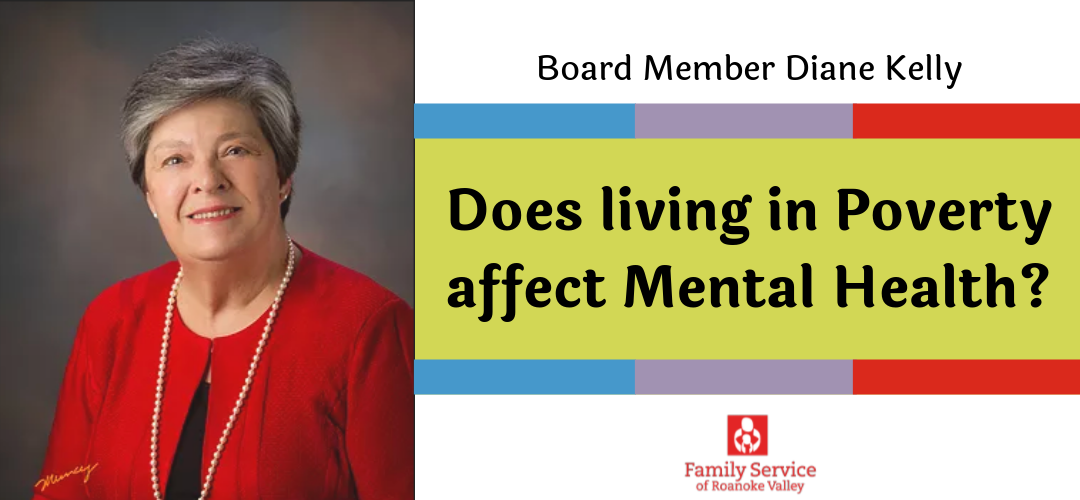Diane Kelly, retired Executive Director of Mental Health America of Roanoke Valley, joined the Board of Directors for Family Service of Roanoke Valley in August 2017. She brings a wealth of knowledge about mental health advocacy in Virginia, and the overall landscape of mental health services in the Roanoke Valley.
Family Service is fortunate to have her expertise and abilities on the board. She has a unique perspective about the work we do in making mental health care available to all. In our newly adopted strategic plan, we adopted the mission statement: We transform lives by healing trauma and restoring hope to families and individuals of all ages, through counseling, case management, and life skills education.
We recently sat down with Diane to get her perspective on what is most needed for low-income and at-risk persons and families facing mental health challenges in our community. Here’s what she had to say:
Research indicates a higher rate of people living in poverty are affected by mental health issues. What challenges do they face in seeking treatment?
Individuals living in poverty face a number of barriers which make it difficult for them to seek and receive appropriate mental health care. The lack of adequate insurance coverage continues to impact access to services. Those who need medications often do not fill prescriptions—or take their meds only sporadically—because of cost. In the same way, individuals may cancel counseling or psychiatry appointments because the amount of the co-pay makes the treatment unaffordable. Difficulty in navigating a complicated mental health care delivery system, less flexibility in work schedules, limited transportation, problems in obtaining childcare while attending appointments, sporadic telephone service, and housing instability/frequent moves all present additional barriers for these individuals.
Does living in poverty cause mental health challenges or does having mental health challenges mean someone is more likely to live in poverty? Is it both?
There is a genetic predisposition to develop mental illnesses just as there are other genetic predispositions to develop diabetes, arthritis, or high cholesterol. Poverty does not “cause” mental illnesses, but many of the stresses related to living in poverty are “risk factors” which can cause symptoms of the mental health problems to appear or to be more severe or pronounced.
The struggle to deal with the ongoing stress of poverty—concerns about housing instability, unemployment or potential loss of employment, arranging appropriate childcare, providing adequate food for the family, accessing medical care only in an emergency because of cost or access issues—is linked closely to the development of depression and anxiety disorders.
What do you think community members need to know about the difficulty of rising out of poverty while dealing with untreated mental illness?
Community members should not make assumptions which perpetuate the stigma attached to mental illnesses and individuals who struggle with those disorders. Take time to find out the facts about signs, symptoms, and treatments of the various disorders.
- Over half of all psychiatric illnesses begin by the age of 15
- 75% of all psychiatric illnesses start by age 25
- Three-fourths of all substance use disorders begin by the age of 27
Add to those statistics the fact that there is often a gap of eight to 10 years between the individual onset of symptoms and the development of an appropriate treatment plan. Lots of things happen between the ages of 15 and 25: high school graduation, moving away from the family home and/or community, entering college or trade school, obtaining employment, learning to drive, new relationships, becoming legal age to drink, having children—the list could go on and on. Imagine navigating these life changes while also dealing with an undiagnosed, untreated, or under-treated mental health problem. The result is often seen as interrupted employment and education, damaged relationships with family and friends, physical health challenges, substance misuse, a delay in assuming adult responsibilities, and, all too often, involvement with the criminal justice system. Each of these factors also presents a unique challenge to those who are seeking to rise out of poverty.
What do you think the community could do to ensure people in poverty have better access to mental health care?
A central intake process through which individuals needing care would get timely and appropriate referrals to services for which they would qualify—the right treatment at the right time—would be a wonderful place to start! Making sure that services are provided at times convenient for clients and that adequate transportation to appointments is available would eliminate two major barriers which those living in poverty often face in accessing care. And, of course, we always need to recruit additional psychiatrists and other mental health professionals to provide high-quality treatment for all the members of our community.
Thank you for sharing your insight with us! Is there anything else you would like to add?
Yes, as a new board member with Family Service, I am excited to be on the ground level of the newly adopted strategic plan, Engage 2020. Through the plan, Family Service has a wonderful opportunity to lead agencies and policymakers in the Roanoke Valley in bold advocacy initiatives to develop and sustain a broad array of mental health and substance misuse treatment services for all those in our community who face mental health challenges.


